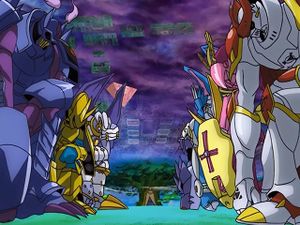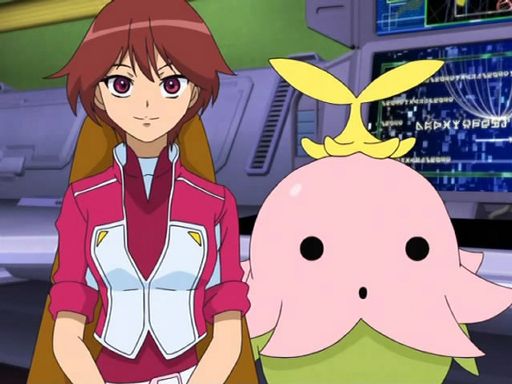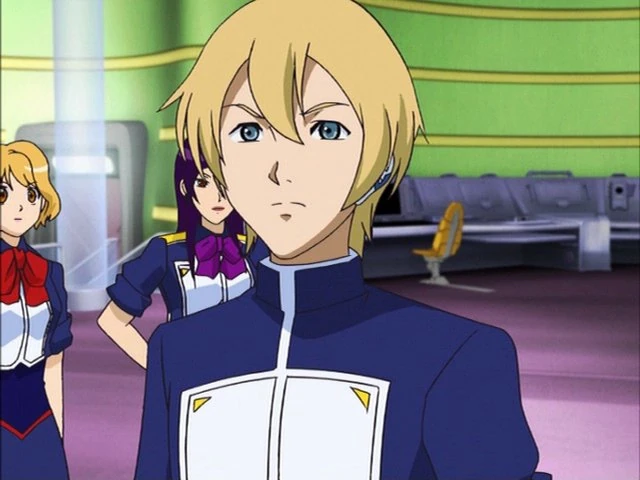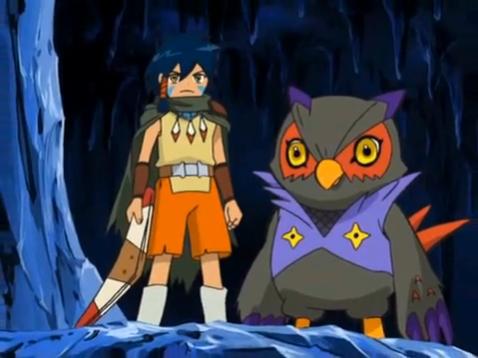The first two seasons are the ones the most people remember
since they’re within the same continuity and hooked everyone to begin with. Like some people, I lost interest in Digimon
around the time Tamers came along because of the unfamiliar characters and
tonal shift. Then I missed out on the fourth
season, Digimon Fronteir thanks in part to airing on a new channel. I did catch up with the ones I missed on
Disney channel re-runs and appreciated them on their own merits, but I still
preferred the original adventure. When I
got to Digimon: Data Squad, the fifth series, I wasn’t able to catch every
single episode, but what I did watch was interesting and possibly even darker
than Tamers. Fusion, the most recent
one, I was able to watch in its entirety.
It was pretty fun, but certainly not my favorite.
For a long time Digimon was unlocky when it comes to home
releases. It was a very TV-only affair
for a long time. Some of the seasons got
a few episodes on VHS or DVD if it was lucky.
You could only really watch the series outside of TV through recordings
of the TV airings, which weren’t the optimum quality. After over a decade of this, things changed
around the 2010s when New Video Group released them all in DVD box sets for
relatively cheap prices. Crunchyroll
also streamed the Japanese versions of the earlier series and Netflix added
Digimon Fusion to their lineup. Since
it’s one of the more controversial Digimon seasons not enough people have seen,
I thought it best to take advantage of this and get the box set for the season
I don’t think enough people have seen: Digimon: Data Squad.
The story follows the titular Data Squad, also known as DATS
(Digital Accident Tactical Squad), an organization dedicated to maintaining
peace between the Digital World and human world both by attempting negotiations
with Digimon and hunting down rogue Digimon breaking through to the human world,
all while maintaining public secrecy, MIB-style. They even have their own neuralizers.
Data Squad has four main characters to put its focus on this
time around, a smaller number than most seasons. The first is Marcus Damon, a hot-blooded
street fighting school punk who makes a manly shonen fighting friend in Agumon
in the first episode and is allowed to keep him by agreeing to be a member of
the Data Squad.
Marcus is so much of a hardened fighter he can only
Digivolve by fighting. The Data Squad
digivolves their Digimon using DNA, Digimon Natural Ability. It’s a kind of spirit energy that makes more
sense in Japanese, where it’s called Digisoul.
DATS members have to charge their digivices by channeling DNA into their
hand and then into their digivices. For
some reason Marcus can only charge his when he punches the opposition,
presumably because he’s only really feeling alive when he’s fighting. DNA seems to also power up his fist because
over the course of the series Marcus punches mega level Digimon and what is
supposed to be an impenetrable shield that even their strongest Digimon
struggle with! It’s so stupid, but
also badass in its audacity.
Yoshino is a veteran of the Data Squad, often acting as the
big sister to the team. She’s always
keeping the others in check when on the field.
Her partner is the sweet, adorable and like-minded flying flower Digimon
Lalamon. She doesn’t get as much
development as the other two, but she’s a very well-defined character all her
own.
Thomas H. Norstein is the Aiden to Marcus’ Avan, right down
to the voice actor (please tell me you played Valkyria Chronicles 2). Adopted into Austrian Nobility, Thomas is a prodigy
who starts the series as a stuck-up perfectionist. He’s dedicated to the job and like him, his
partner Gaomon is strict and obeys orders with a “sir yes sir”. While a compassionate soul, Thomas is also
very analytical and kind of an overthinker.
He butts heads with Marcus a lot, but as the usual dichotomy goes, they
both learn from each other that there’s times for thinking and times for
action, putting them much more in synch with each other as the series goes on.
Finally there’s Keenan Thompson, who’s introduced a ways in.
Keenan is a wild child who was
accidentally sent to the digital world when he was a baby and raised believing
he’s a Digimon by a very kind and loving Frigimon. At first Keenan follows the rhetoric of the
first major antagonist (I hesitate to call him a villain) Merukimon, one of the
12 Olympus Digimon ruling over a section of the digital world. Many Digimon hate humans, believing they are
a threat to Digimon, something ingrained into Keenan from his upbringing. Over Keenan’s development he spends time with
DATS, learns more about humans and his origins and joins the team with his
guardian Digimon, Owlmon. Keenan’s
survival in the wilderness of the Digital World gave him acrobatic ninja skills
and Owlmon is a more literal ninja himself, complete with headbands and
shuriken.
Characters play off each other very well in Data Squad and they’re
backed up by a host of various side characters that may not have the same kind
of focus or development, but are an integral part of a lot of the main
character’s and all have solid characterization of their own. It helps that in this series adults are
allowed Digimon. For other Digimon
series, only the kids are allowed to have Digimon partners, be it because
they’re pure of heart or because the writers are told this has to be written
specifically for the kids watching. In
Data Squad, DATS and the idea of partnering with Digimon have been around for a
long time, so the original founders all have theirs and thus their own
interesting relationship with their partner Digimon. Even the initial DATS members act more like
young adults than children. It makes
them more relatable to an older audience, which is likely what they were going
for.
My favorite supporting character of them all of course is
Richard Sampson, the head of DATS who seems to always be in control of what
happens, even when it doesn’t go how he wants.
He’s also voiced by Jamieson Price so after Tales of the Abyss that
makes DATS the new Jamieson Price Posse.
 |
| Sam Riegal voices his partner Tsunemon. |
Just like many Digimon series before it, Data Squad is structured
like a game and very good at pacing and escalation. It starts out introducing the characters with
some starter enemies, gets a primary antagonist later on, has a climax against
them and then a new overarching enemy rears their head, then they repeat this
until they have to fight god. While it
all goes on their Digimon gain new forms and more power to match the rising
threat.
The dark tone comes in when the villain of pretty much the
entire thing is properly introduced, the human scientist Kurata. Data Squad has a few arc villains that each
have their own quirks and motivations that connect to each other in some way,
but he’s the big one.
 |
| Not used for real Digimon. |
Kurata is one of the best villains Digimon ever had by
virtue of being the most heinous and unlikeable. At least with evil Digimon they’re sort of
predisposed to being villains because they’re virus-type Digimon and there
wasn’t much of a moral dilemma with the human villains because they were
mislead, mistaken or otherwise corrupted for one reason or another. Kurata is nothing like that. He’s a genocidal sociopath who murders all
Digimon for both petty and prejudicial reasons, to further his own ends and
just for fun. I do mean all Digimon of
any shape or size and I do mean murder.
One law that carries over from the other series is that when
a Digimon dies their data is reconfigured into an egg to be reborn, but unlike
the first two seasons, there’s no Primary
Village
Kurata invented death rays that permanently delete a Digimon
and makes their digi egg self-destruct.
Using them, he is hell bent on totally depopulating the digital world of
every last Digimon. To twist the knife
further he uses dead data from Digimon to make his own artificial robot Digimon
that are also equipped with said death rays, meaning he is killing more Digimon
through killing more Digimon and the series doesn’t try to avoid the fact that
that’s what it is.
He’s a cowardly liar too, scheming ways to get people to
believe Digimon are a threat and eventually getting the military on his
side. He steps on and stabs in the back
everyone who associates with him Chris Niosi-style until he leads to countless
deaths and monumental destruction, not once showing any kind of remorse or
questioning that what he might be doing is at the very least morally
questionable. It’s pretty amazing to watch
how just one human with no (real) Digivice and no real special powers can
thoroughly destroy everything in every conceivable way right down to tearing
apart the fabric of reality. He servies
as a great contrast to DATS’ bond with their Digimon too when he tries to
forcibly take control of one. He doesn’t
have depth, but he’s well-established and a good antithetical antagonist to the
heroes.
The action that ensues from those opposing forces clashing
is the best it’s ever been. Data Squad
shows how much more the animators had to work with than previous iterations, with
mood lightning and computer generated spectacles like flame and digital
distortion effects. The Digivolution
sequences, as recycled as they may be, are also beautiful. I’d say it’s the most beautiful the franchise has ever seen, but the ones in Digimon
Fusion come too close to call.
In movement the animation in fight scenes themselves is a
step above previous seasons and have a lot of great shots with next to no
recycled animation, but at the end of the day it’s still digivolving Digimon
beating up each other with flashy powers. Digimon never had the kind of fighting insight in shonen series like Yu Yu Hakusho or Kenichi. It's more about each leap in power being an important character moment. It's familiar and fun, kind of like people who never get sick of
Godzilla movies, although Data Squad isn’t a long-runner like the king of the
monsters is. Quite the opposite, in fact.
Observant fans may take notice that at 48 episodes, Digimon:
Data Squad is the shortest Digimon season yet, but rather than be a strike
against it, I think the episode count is more evidence of its pacing.
A lot of Digimon series end up following some formulas, such
as having one of the partner Digimon digivolve in their own episode, resulting
in many throwaway antagonists never mentioned again. Data Squad has this formulaic writing
structure a few times, but only a few times.
Apart from the first handful of episodes establishing DATS’ operations
and the last handful fighting antagonists one episode at a time, every episode
continues off of each other. The main Digimon
do digivolve sequentially and villains have one or two episodes dedicated to
fighting them to make way for the next one, but they play into what is
happening in the story and every episode moves the plot along. Data Squad never loses focus on the main idea
and that’s one of the things I appreciate about it the most.
For some, this means there’s less wondrous adventure in
seeing the Digital world and developing characters. For me, that means sticking to the
interesting plot.
With the more expressive art style, complex and focused plot,
good villains and good characters, Digimon: Data Squad might be one of the best
things ever made for Digimon if you can get past that it’s not the same kind of
adventures it’s used to and it only gets better with one of the greatest English
anime writers of all time: Jeff Nimoy.
Yes, Nimoy was brought back to adapt Data Squad into English
after his absence from Tamers and Frontier (although he did come back for the
Revenge of Diaboromon movie). He along
with Quentin Flynn were given a lot of freedom with Data Squad. In Flynn’s own words, they “went to town.”
Nimoy has said that Data Squad is his favorite Digimon
series and that he had a lot of luxuries with it he couldn’t have with the
first two seasons. For one, he watched
the Japanese version online before he started working on Data Squad so any
slight changes to the script wouldn’t contradict themselves like they did at a
few points in the first few seasons. For
another he was mostly left to his own devices, as opposed to Adventure 02 where
he was always being urged to add more jokes to it. They were funny jokes, another example of how
he can make good even out of the worst situation, but even he didn’t like the
way it interfered when the show needed to be serious.
Since he was in charge of casting and voice direction, it
only makes sense Flynn got to voice the main character Marcus and Nimoy voices
his father. We all know how good Flynn
is at playing excited young men.
Much as it’s fun to crack jokes at the actors, the voice
direction is very good. Nimoy brought
back a lot of the Digimon all-stars and every single one fits their character
like a glove. As Nimoy has noted,
Freeman and Flynn work very well off each other, both from some friendly
rivalry in real life and because both specialize in playing characters with the
same personalities Marcus and Thomas have.
I don’t think I could’ve chosen a better casting choice.
Colleen O’ Shaugnessy is also great as a beleaguered voice
of reason, Kirk Thorton can be just about anything, Richard Epcar is a giant
badass with a giant voice and of course there’s Jamieson Price. The credits make a point to credit him as
“Jamieson K. Price” because otherwise people might get the idea his middle name
is “F**ing.”
Even though they don’t get much screentime, the minor
characters have just as much voice acting skill when it isn’t clearly Jeff
Nimoy playing double duty. Mona Marshall
is my favorite as she plays Keenan’s Frigimon foster mother and her voice is so
soft and motherly it makes Frigimon more of a teddy bear than the actual teddy bear Digimon, making what happens to her even more devastating.
Less associated with anime is Kurata’s voice actor. Brian Palermo seems to be more of an improv
actor rather than an actor specializing in anime voice acting like the other
cast members are, but he sure seems like someone Nimoy would know. Maybe it’s because he isn’t a full-time voice
actor that he’s so perfect for it, acting as a human instead of a big booming
fantasy creature or shonen anime hero. A good villain relies
a lot on their actors performance and Palermo
Admittedly, the dub can fall to some lip lock every now and then
and some dialogue doesn’t come out as naturally as it should because of it, but
for the most part it’s a very serviceable script almost completely true to the
Japanese one and that’s with the censorship.
Like the ones before it, Digimon Data Squad’s English
version was subject to some changes for broadcasting standards, but you’d be
surprised how well they were written around.
Nimoy clearly wanted to edit the bare minimum possible. Only on the rarest of occasions do cuts take
off more than 4 seconds of the runtime total.
They take literal split seconds to cover the impact of certain blows,
they edit blood and they paint over some of the more suggestive outfits for
specific shots. They do edit out a lot
of the Japanese text in backgrounds, but it's my understanding this is a request companies often make
so they can have an edited version to export to other countries for their dubs.
As usual for the censors, characters almost never say the
word “die”, and admittedly it can get repetitive, but the English version pulls
no punches even with that setback. This
isn’t like the censorship where characters are sent to the shadow realm or a
dungeon in the digital world and nowhere is that more apparent than in the episode
where a mentally assaulting Metalphantomon makes Thomas relive his mother
dying. Sure, they make it obvious she
was hit by a truck in front of Thomas’ innocent eyes after throwing him out of
the way while Paul St. Peter’s hellish growly voice torments him as Freeman
very convincingly cries in agony, but they didn’t say “die” so it’s all good as far as standards and practices are concerned.
There’s a similar situation in renaming the final antagonist
from “Yggdrasil” to “King Drasil.”
 |
| No. |
In the original Japanese version, Yggdrasil is the god of
the digital world, but presumably because calling something a god is taboo on kids programs (the Egyptian gods in Yu-Gi-Oh are just monsters and based on common mythology so they got a pass), he had
to be renamed King Drasil and be the king instead of the god. The English version pretty much did a
find-replace on the script to replace the word “god” with “king” and
“Yggdrasil” with “King Drasil”. He’s
still all-knowing, he still controls reality to an extent and he’s still a myth to Digimon
in the first place, but they don’t say “god” so it’s all good. At least being called a king kind of fits thematically with
having the Royal Knights on his side.
 |
| The Royal Knights have a guest star team of voice actors. |
I also found an obvious broadcasting standards edit funny
when Marcus suddenly narrates to point
out that a city being leveled onscreen was evacuated. They used to do that to laughable levels when
Dragon Ball Z first aired in America
There is one particularly notorious edit in one episode that
I have to point out or someone will tell me.
In episode 7, Thomas takes Marcus’ sister Christie to an amusement park
and it’s attacked by Bombernanimon, a giant bomb Digimon. Bombs and possible acts of terrorism are
banned on children’s TV nowadays (though later on they’re allowed refer to an
explosive as a charge) so Disney was threatening to pull it. Nimoy didn’t want that because not only is it
a funny episode, but it’s also kind of important for Thomas and gives him a
much-needed spotlight. Instead Nimoy had
fun and added to the silliness of the episode by turning Bombernanimon into a
giant orange throwing exploding green citrus fruits everywhere and filled the
confrontation with juice puns. For added
fun, he had Kirk Thorton give “Citrumon” his Don Patch voice, another round
orange character from Bobobo, which Nimoy also wrote for.
I do not agree with these annotations.
I didn’t even think it was edited the first time watching it
years ago because it’s far from the weirdest Digimon concept out there and I loved
it anyway. It’d be one thing if it had
anything to do with the overall plot, but it doesn’t. Nimoy can make the best out of a bad
situation.
Even with all the changes made, I prefer the English
version. Not only is the voice acting
and writing just as good and possibly better than the Japanese version, but it
also has a very impressive soundtrack.
Not unlike Bruce Falconer’s music for the original English version of
Dragon Ball Z, Data Squad’s English soundtrack is very different from the
original, but will definitely be much preferred to some people. The credited composer for the English version
also did the music for Zatch Bell and has a lot of credits in sound mixing and
design, including the trailers for some big-name movies like Ant Man.
The opening song is catchy, but nothing to write home about. The background music, on the other hand, is
used to great effect and has a range of different moods for the situation. It can be quiet and subtle, but when the
action starts it hits heavy with chugging guitars and renditions of the opening
theme. I especially like how the music
for the digivolution sequences is more intense depending on what stage of
digivolution is being reached, so by the end the hard starting note positively
shakes with intensity. Sometimes an
all-new soundtrack for an English dub can make anime even better and in Data
Squad I think that’s the case. It’s a
far cry from the first two seasons and its constantly re-used synthesized
tracks and vocal songs. Data Squad’s
English soundtrack is good enough to be worth releasing on CD.
The sound mixing for the new soundtrack and voice acting is
spot-on too and that may be in part because the footage is the raw footage made
for TV. It’s a minor point to bring up,
but from what I read, the DVD releases of the first 2 Digimon seasons still
have their TV ratings show up on the DVD because they probably couldn’t get the
footage from before they were sent to the TV stations back then. Data Squad doesn’t have that problem as it
looks like they were able to get the best quality footage of the English
version, which may explain the “in association with Jetix” credit at the end of
each episode.
And if you’d rather not have these changes the English
version made then you’re out of luck.
Unlike Bobobo, which had an uncut dub that was then edited for TV, Data
Squad was designed for TV in the first place and even if the editing is
extremely light, that means the Japanese audio can’t be synched to it. This DVD set is English-only. I’m sure that will turn a lot of anime fans
off, but it might be why it’s such a low price.
It’s a 48-episode series that goes for about 20-50 dollars brand new if
you can get the best price. Compare that
to something like Danganronpa 3, which is 50 dollars for only 13 episodes, as
if I needed more reason to hate what Funimation has become.
There’s little in the way of extras. There’s a small guide booklet showing some of
the primary characters and an image gallery showing stock art of the series’
villains, but that’s about it. If you’re
buying this DVD set you’re buying it for the English version of the anime and I
recommend that plenty. I am extremely
happy I could watch this series again.
Taking everything that made Digimon meaningful with some modern
sensibilities, a new coat of paint and passionate dub team, I’ve come to see Digimon:
Data Squad may be the best Digimon series since the original. I give Digimon: Data Squad an 8 out of 10.






Never cared for the show. Marcus is annoying. The punching gimmick is daft. And Kurata is a lame overated villain who only got as far as he did due to other characters acting like morons...
ReplyDeleteIt seems to appeal to those who appreciate a balance between adventure, action, and darker undertones. Thanks for your share about the concept of DNA digivolution and Digimon Natural Ability. But I prefer the Sub, probably I'm not gonna buy the DVD. Anyway, you could download on Crunchyroll rather than Funimation for other anime series.
ReplyDelete